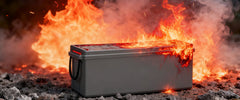
What to Do If a Lithium Battery Catches Fire – Prevention & Safety Guide
, 5 Tiempo mínimo de lectura


, 5 Tiempo mínimo de lectura
Lithium batteries are now part of daily life—from EVs, RVs, and solar energy systems to e-bikes, power tools, and smartphones. Their advantages—high energy density, long cycle life, and lightweight design—make them the preferred choice for modern energy storage.
But there’s one critical downside: fire risk. While rare, lithium battery fires spread quickly, release toxic smoke, and are difficult to extinguish.
☛ This guide explains why lithium batteries catch fire, how to prevent accidents, and what to do in an emergency—whether at home, on the road, or at work.
If you notice smoke, popping sounds, or overheating:
1. Evacuate people immediately.
2. Call emergency services (“Lithium battery fire”).
3. Use an ABC dry powder, CO₂, or foam extinguisher (only if small & safe).
4. Never use water on large fires.
5. Wait for firefighters if uncontrolled.
Lithium battery fires usually result from thermal runaway—a self-heating chain reaction inside the cells. Common causes include:
☞ Example: An e-bike left charging in a closed garage overnight overheats, releasing smoke and eventually catching fire.
Most incidents are preventable with proper battery care:
✅ Buy & Use Safely
Example: Sunrich Energy 12V 100Ah Heated Battery, when used with its matching charger, significantly reduces the risks of overcharging, short circuits, and fire.
✅ Install & Maintain Properly
✅ Store & Transport Correctly
Example: Some advanced LiFePO₄ batteries, such as Sunrich Energy heated models designed for RVs and marine use, include cold-weather charging protection.
✅ Training & Safety Practices
Step 1: Safety First
Step 2: If Fire Is Small
Step 3: If Fire Is Large or Uncontrolled
For Households, RVs, and Small Setups:
For Businesses & Fleets:
Lithium battery fires are rare, but the risks are real. Prevention is the best protection—use certified batteries, the right chargers, and safe storage practices.
If a fire does happen, remember:
☛ Action Step for You: Check your home, RV, or workplace today: Do you have a proper fire extinguisher nearby? Are your batteries protected by a BMS? Preparing now could save lives later.